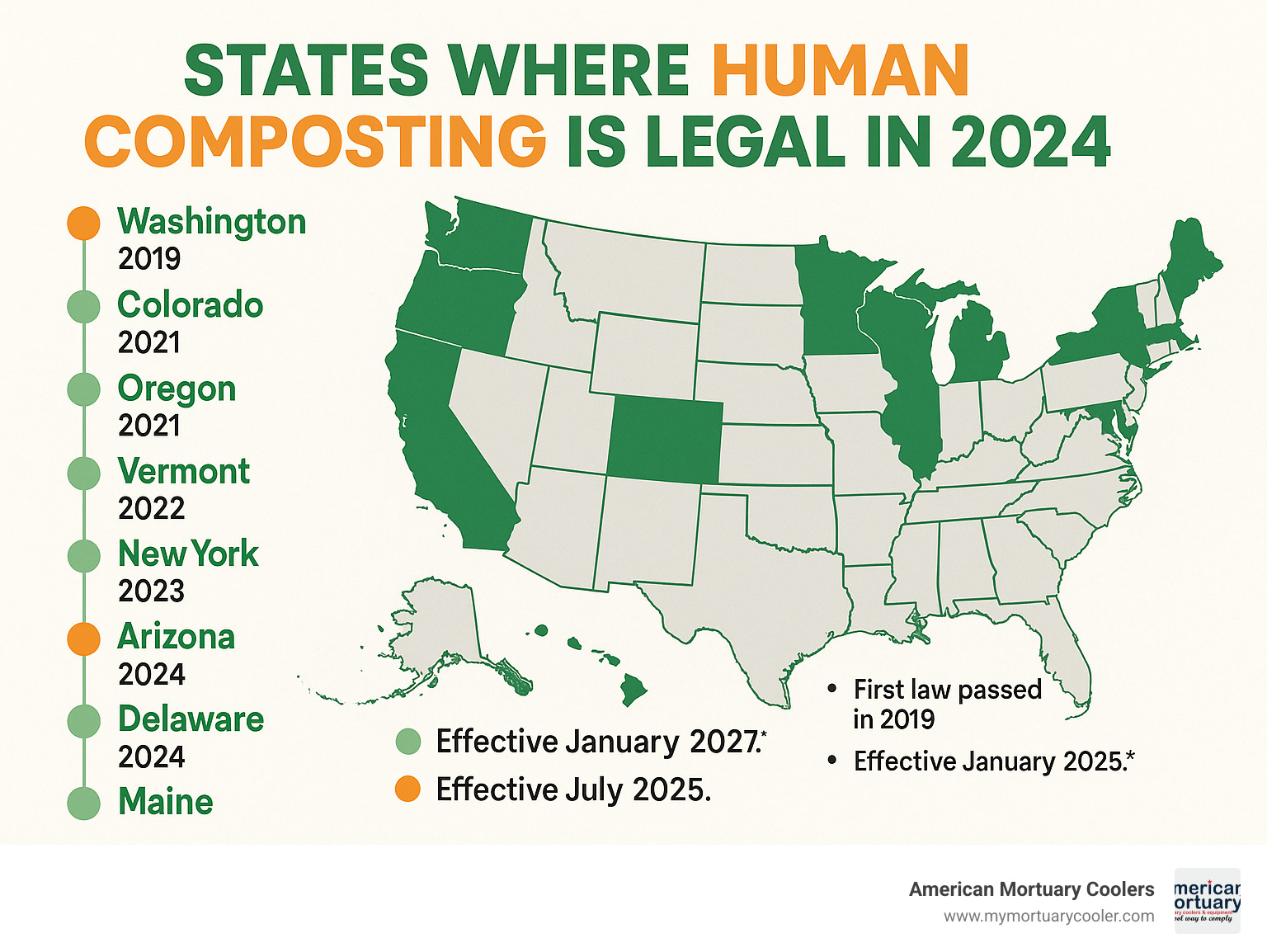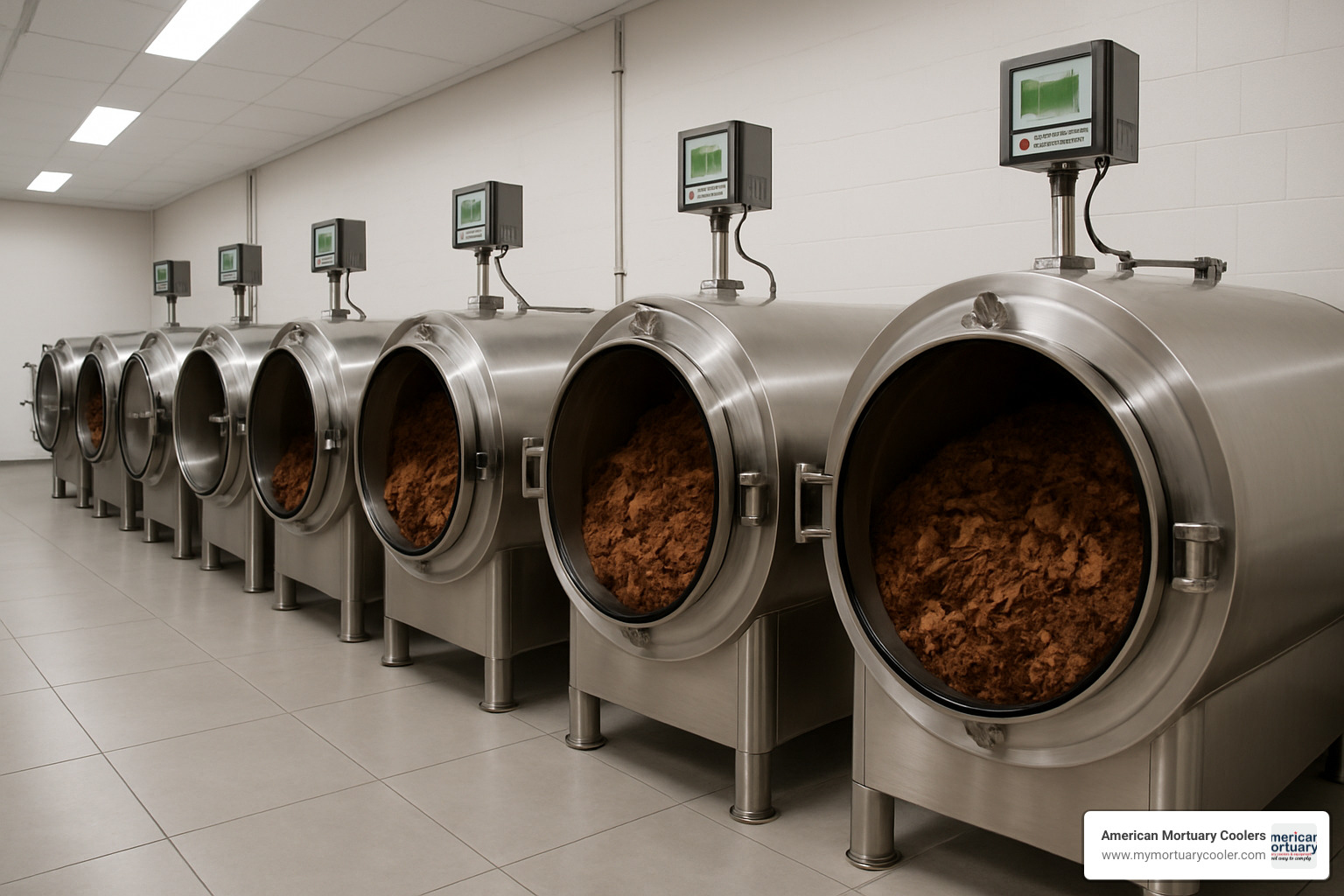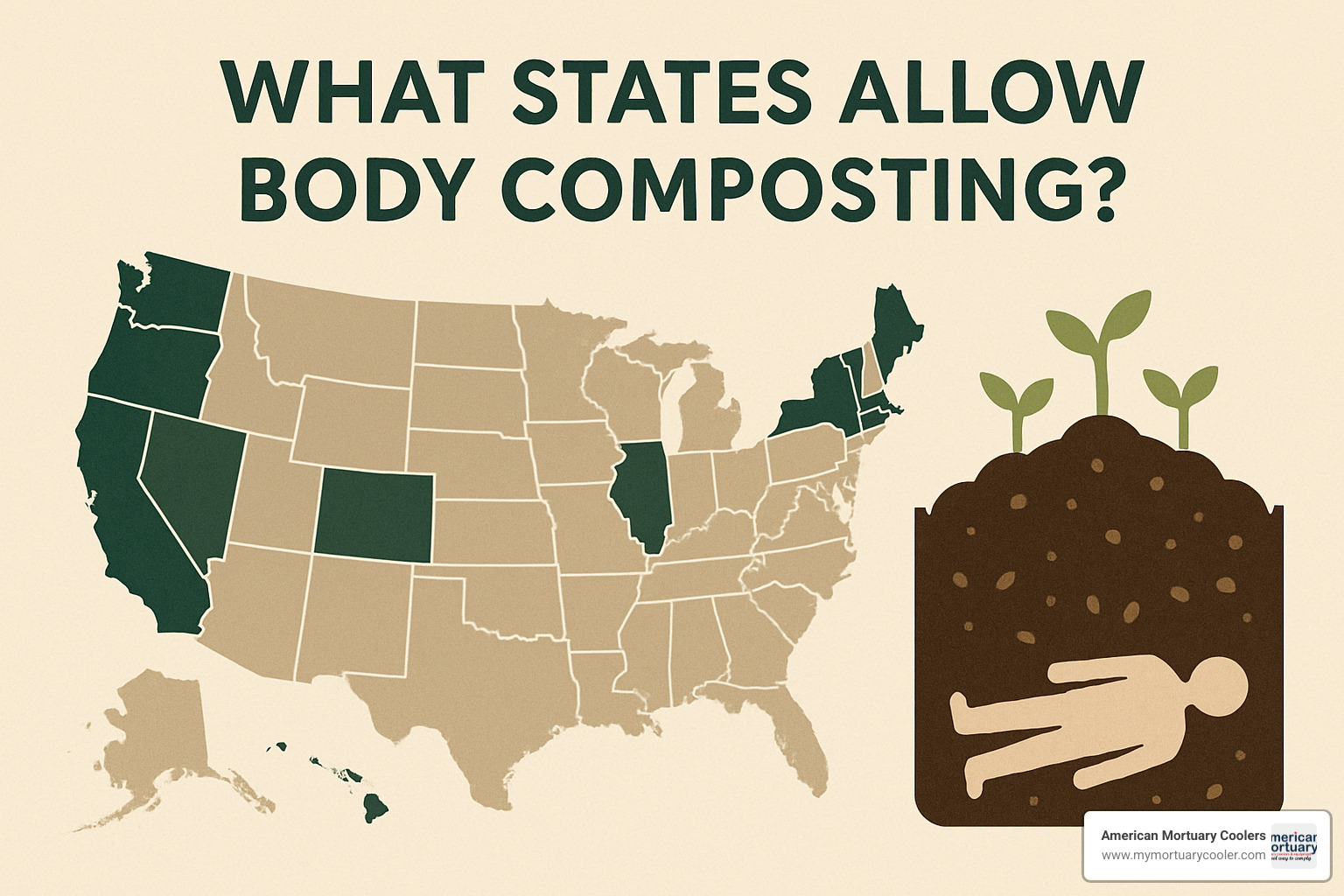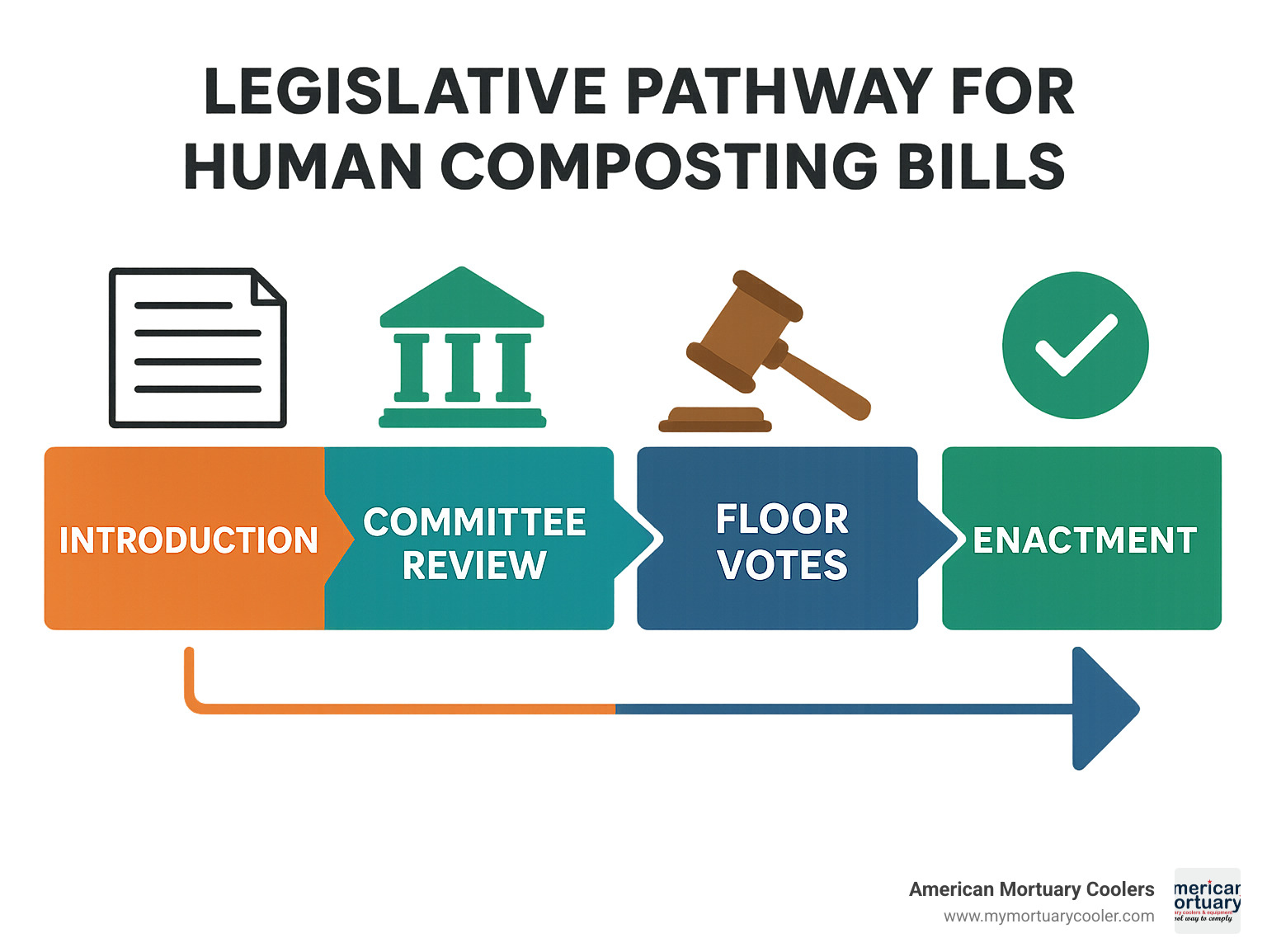Why Understanding Body Composting Laws Matters for Funeral Professionals
What states allow body composting is becoming one of the most frequently asked questions in the death care industry as more families seek eco-friendly alternatives to traditional burial and cremation. This sustainable process, also known as natural organic reduction, transforms human remains into nutrient-rich soil over approximately 45 days.
Currently, 12 states have legalized human composting:
- Washington (2019) - First state, operational since 2020
- Colorado (2021) - Operational
- Oregon (2021) - Operational
- Vermont (2022) - Operational
- California (2022) - Effective January 2027
- New York (2022) - Legal but not yet operational
- Nevada (2023) - Legal but not yet operational
- Arizona (2024) - Legal but not yet operational
- Maryland (2024) - Legal but not yet operational
- Delaware (2024) - Legal but not yet operational
- Minnesota (2024) - Effective July 2025
- Maine (2024) - Legal but not yet operational
The demand is growing rapidly. According to industry data, 60% of consumers over 40 express interest in green funeral options, while facilities like Recompose in Seattle report that 29% of their clients come from out-of-state due to limited availability nationwide.
As Mortuary Cooler with experience in mortuary equipment and death care industry trends, I've witnessed how funeral professionals are adapting to serve families seeking sustainable options in states that allow body composting.

Glossary for what states allow body composting:
How Does Human Composting Work?
If you're wondering about the science behind what states allow body composting, understanding the actual process helps explain why this method is gaining legal acceptance across the country. Human composting, or natural organic reduction, works by accelerating nature's own decomposition cycle in a controlled, respectful environment.
Over 45 days, naturally occurring microbes break down human remains into approximately one cubic yard of nutrient-rich soil. No artificial chemicals or additives are needed—just the power of beneficial bacteria working exactly as they do in forest floors and garden compost piles.
Bodies are placed in specialized steel vessels with wood chips, alfalfa, and straw—materials chosen specifically for their carbon-to-nitrogen ratios. The microbes already present in these organic materials do all the heavy lifting.
Temperature control is absolutely critical for both safety and success. The composting vessels must reach and maintain at least 150°F for three consecutive days to eliminate any harmful pathogens. This heat occurs naturally from the microbial activity—no external heating required.
Scientific research on carbon savings demonstrates that human composting saves over one metric ton of carbon compared to cremation or conventional burial, making it the most environmentally friendly option available for human remains.
Environmental Benefits Over Burial & Cremation
The environmental impact differences are significant when you look at the numbers. Traditional burial practices in America consume 4.3 million gallons of embalming fluid annually and bury 1.6 million tons of concrete in burial vaults. Those chemicals can leach into groundwater and soil for decades.
Cremation produces an average of 535 pounds of CO₂ per body. That's equivalent to driving your car 609 miles. In contrast, human composting produces no net CO₂ emissions and actually helps sequester carbon in the resulting soil.
Land conservation tells an equally compelling story. Traditional cemeteries need ongoing maintenance, regular watering for landscaping, and permanent land dedication. Human composting eliminates these requirements entirely while creating soil that can restore damaged land and support reforestation projects.
Step-By-Step Vessel Process
The actual composting process follows a carefully choreographed sequence. The body is first placed in a steel vessel alongside precisely measured amounts of wood chips, alfalfa, and straw. These materials contribute specific carbon and nitrogen content that creates the perfect environment for beneficial microbes.
Once the vessel is sealed, nature takes over. The microbes begin their work immediately, breaking down organic matter and generating the crucial 150°F heat needed for pathogen elimination. The contents are rotated weekly to ensure proper airflow and even decomposition.

After the 30-40 day vessel period, the contents are carefully removed and screened. Any non-organic materials like surgical implants are respectfully removed. Larger bones go through a bone refinement process—they're ground into smaller pieces to complete decomposition naturally.
The material then enters the curing phase, spending 3-5 weeks in outdoor piles. This final step ensures complete stabilization and optimal soil health.
The end result is screened once more to achieve a consistent, soil-like texture with a pH of 6.5-7—perfect for plant growth. This nutrient-rich soil contains balanced macronutrients and beneficial microorganisms that improve soil health wherever it's used.
What States Allow Body Composting in 2024?
When families ask what states allow body composting, the answer isn't as straightforward as you might expect. There's a big difference between states that have passed laws making it legal and states where you can actually arrange the service today.
Right now, 12 states have legalized human composting, but only four of them have facilities up and running. Washington blazed the trail, becoming the first state to legalize human composting in 2019. By May 2020, they had facilities operating. Colorado, Oregon, and Vermont have followed suit, successfully making the jump from "legal on paper" to "available in practice."
The other eight states are in various stages of the waiting game. California has set a clear timeline with services starting in January 2027. Minnesota will begin offering services in July 2025. The remaining states have passed the laws but haven't announced when facilities will open.
This delay happens because passing a law is just the first step. States need to create detailed regulations, establish licensing procedures, and develop safety protocols.
| State | Legal Status | Operational Status | Effective Date |
|---|---|---|---|
| Washington | Legal | Operational | May 2020 |
| Colorado | Legal | Operational | 2021 |
| Oregon | Legal | Operational | 2022 |
| Vermont | Legal | Operational | 2023 |
| California | Legal | Pending | January 2027 |
| New York | Legal | Pending | TBD |
| Nevada | Legal | Pending | TBD |
| Arizona | Legal | Pending | TBD |
| Maryland | Legal | Pending | TBD |
| Delaware | Legal | Pending | TBD |
| Minnesota | Legal | Pending | July 2025 |
| Maine | Legal | Pending | TBD |
The regulatory rulemaking process typically takes anywhere from six months to five years. Each state has to figure out everything from facility licensing to soil testing requirements to transportation rules.

Finding Out What States Allow Body Composting If You Live Elsewhere
Living in a state that hasn't legalized human composting doesn't mean you're out of options. Interstate transport of human remains is perfectly legal under federal regulations, and many families are already taking advantage of this.
The key is finding a local funeral home that understands the process. You'll need proper permits and documentation, but it's far from impossible. We've worked with funeral homes across the country and many have successfully coordinated these arrangements.
The most important requirement is that the body cannot be embalmed. Embalming chemicals interfere with the natural decomposition process, so bodies must be kept refrigerated instead. This actually makes transport simpler in many ways, though it does require careful timing and coordination.
Your local funeral home will work with a receiving facility in a state where human composting is operational. They'll handle all the paperwork, permits, and logistics.
Can Human Bodies Be Composted? A Comprehensive Guide walks through all the technical and legal details if you want to dive deeper into the requirements.
Can I Use Services in States That Allow Body Composting From Out of State?
Absolutely, and you're not alone in considering this option. Nearly 30% of clients at Recompose, Seattle's pioneering human composting facility, come from out of state. That's a clear sign that interstate arrangements work well for families.
The no-embalming rule actually makes things easier for transport. Instead of dealing with embalming chemicals and their associated regulations, bodies are simply kept refrigerated during transport.
Once the composting process is complete, you have choices about what happens to the soil. The process creates about one cubic yard of nutrient-rich soil - enough to plant a good-sized memorial tree or create a small memorial garden. Some families take all the soil home, others take just a portion, and some donate it to conservation projects.
Many families find meaningful ways to use the soil. Memorial tree plantings are popular, as are memorial gardens or donating to reforestation projects. It creates a living tribute that continues to grow and benefit the environment for years to come.
The logistics work smoothly when you plan ahead. Your local funeral home coordinates with the composting facility, handles the transport, and can even help arrange for the soil to be returned to you.
States on the Horizon & How to Advocate
The wave of support for what states allow body composting keeps growing stronger each year. Right now, more than 15 states have bills sitting in their legislatures or are seriously talking about making human composting legal. Connecticut, Illinois, Massachusetts, Rhode Island, and Utah are leading the charge with active legislation moving through their state houses.
A bill gets introduced by a state representative or senator, then it's assigned to a committee - usually the health committee or judiciary committee. The committee holds public hearings where people can speak for or against the bill, then they vote on whether to send it to the full legislature.

Grassroots advocacy works. The #IdRatherBeCompost movement has shown how regular people can make a real difference. Write a letter to your state representative sharing why environmental funeral options matter to you. Tell them about your values and how human composting aligns with your beliefs about caring for the earth.
Building community awareness is another powerful tool. When people learn about human composting for the first time, many are surprised by how dignified and meaningful the process can be. Scientific research on public interest shows that 60% of consumers over 40 are interested in green funeral alternatives - that's a lot of potential supporters who just need to know this option exists.
Religious & Cultural Considerations
Navigating religious and cultural perspectives on human composting requires patience and respect. Different faith communities have varying views, and that's completely understandable given how deeply personal end-of-life decisions are.
The Catholic Church has raised concerns about maintaining the dignity of human remains. The California Catholic Conference has described human composting as potentially "undignified," which reflects genuine theological considerations about how we honor the human body after death.
On the other hand, some Jewish rabbis are exploring how natural organic reduction might fit within Jewish law and tradition. They're working on liturgical adaptations that honor both the environmental benefits and the religious requirement to return to the earth.
Green-faith movements across many denominations are finding common ground in environmental stewardship. For these communities, choosing human composting becomes a final act of caring for creation - a spiritual practice that extends beyond death.
The key to broader acceptance is ensuring that human composting maintains the same dignity as traditional funeral practices. This means having ceremonial elements like laying-in ceremonies, giving families opportunities to witness the process if they choose, and creating space for memorial services that truly honor the person's life and values.
Generational differences play a big role here too. Younger generations, especially those deeply concerned about climate change, often view human composting as a meaningful way to align their final act with their environmental values. As these perspectives become more mainstream, cultural acceptance tends to follow.
Costs, Logistics, and Planning Ahead
When families ask what states allow body composting, cost is often their next question. Human composting typically runs around $7,000, which puts it right in the middle between cremation (averaging $6,971) and traditional burial with a plot (averaging $7,848). It's refreshing to see a sustainable option that doesn't break the bank.
The pricing usually covers everything you'd expect: the actual composting process, use of the facility, basic ceremonial services, and that precious cubic yard of nutrient-rich soil your loved one becomes. What might add to the bill? Transportation if you're coming from out-of-state, special memorial services, or custom containers for taking the soil home.
Pre-need contracts are becoming more common as this industry finds its footing. These arrangements let you lock in today's prices while making sure your wishes are crystal clear to your family. Given how new this field is and how limited facility space can be, planning ahead isn't just smart—it's often necessary.
Facility wait-lists are real. Washington's composting facilities sometimes have waiting periods because demand is high and vessel capacity is limited.
Soil distribution rules vary depending on where you are. Most families can take home all or part of that cubic yard of composted soil. What they don't take usually goes to conservation projects or land restoration—a beautiful way to give back to the earth. Some states require landowner permission for scattering the soil, while others let you use it on private property without red tape.
In-Depth Guide to Human Body Composting walks through all the planning details families need to consider.
Tips for Seamless Pre-Arrangement
Choosing the right provider is your first big decision. Look beyond just location and price. You want a facility that's transparent about their process, properly licensed, and shares your values about dignity and environmental responsibility.
If you live outside what states allow body composting, your transport plan becomes crucial. Find a local funeral home that's comfortable with interstate transport and has experience with the no-embalming requirements. The best funeral directors will already have relationships with receiving facilities and know exactly how to keep everything properly refrigerated during transport.
Timing your celebration-of-life is more flexible than you might think. Some families prefer holding services right away, while others wait until the composting process is complete so they can incorporate tree planting or garden creation into their memorial.
Memorial tree planning gives families something concrete and hopeful to focus on. Whether you're planting a single memorial tree, creating an entire garden, or contributing to a reforestation project, that composted soil becomes a living legacy. Planning these activities ahead of time ensures they align perfectly with your loved one's values and your family's healing process.
At American Mortuary Coolers, we've watched the funeral industry evolve to meet families' changing needs. Our experience supporting funeral homes across the country has shown us how thoughtful planning makes all the difference in honoring someone's final wishes.
Frequently Asked Questions About What States Allow Body Composting
How long before recently legalized states open facilities?
If you're wondering when you'll actually be able to access human composting services in newly legalized states, the honest answer is: it depends, but expect to wait a while. The timeline from legalization to operational facilities typically ranges from 6 months to 5 years, and there's a lot of behind-the-scenes work that has to happen first.
The biggest hurdle is regulatory rulemaking. State agencies can't just flip a switch and say "go ahead, start composting." They need to create detailed rules covering everything from how facilities should be designed to what kind of training staff need. This involves public comment periods, input from funeral directors, environmental scientists, and often multiple revisions before everyone's satisfied.
California offers a perfect example of this timeline. The state passed its human composting law in 2022, but wisely built in a five-year runway - the law doesn't actually take effect until January 2027. This gives everyone time to get their ducks in a row.
States that are moving faster typically learn from the pioneers. Washington, Colorado, and Oregon have already done the heavy lifting of figuring out what works, so newer states can adapt their regulatory frameworks rather than starting from scratch.
Are there limits on where composted soil can be used?
This is one of those questions where the answer starts with "it depends on where you live," but the good news is that most restrictions are pretty reasonable. Generally, you need landowner permission if you want to use composted soil on property that isn't yours - which makes sense when you think about it.
Most states treat the composted soil just like any other high-quality compost you might buy at a garden center. You can use it freely on your own property for gardening, landscaping, or planting memorial trees. The soil has a balanced pH of 6.5-7, making it excellent for plant growth.
Public lands are where things get a bit more complicated. National parks, state forests, and municipal properties often have specific rules about what can and can't be added to the soil. Some require permits, while others prohibit outside materials entirely.
Here's something beautiful that many facilities are doing: they partner with conservation organizations and land restoration projects. If families don't want to take home all of their loved one's soil, it can be donated to help restore damaged ecosystems or support reforestation efforts. It's a way for someone's final act to literally help heal the earth.
Is human composting safe for pathogens and heavy metals?
Safety concerns are completely understandable - this is your loved one we're talking about, and you want to know the process is both safe and respectful. The short answer is yes, human composting is safe when done properly, and the regulatory frameworks ensure it's done right.
The 150°F temperature requirement is the key to pathogen elimination. The composting vessels must maintain this temperature for at least three consecutive days, which effectively kills bacteria, viruses, and parasites. This isn't guesswork - it's based on decades of composting science used in agricultural and municipal composting operations.
The temperature isn't artificially created either. It's generated naturally by the microbial activity during decomposition, then carefully monitored throughout the process. Think of it like a fever that burns out anything harmful.
As for heavy metals and other contaminants, facilities have multiple safeguards in place. Surgical implants, dental work, and other non-organic materials are removed before the final processing. The screening process is thorough and happens multiple times during the 45-day process.
Washington State's facilities have been operating safely since 2020 with regular monitoring and no reported safety issues. Current studies continue tracking the long-term environmental impact, and so far, the data supports what the science predicted - human composting produces safe, beneficial soil.
The regulatory frameworks developed by these pioneering states provide proven templates for ensuring safety in new facilities. As someone who works with funeral professionals nationwide, I've seen how seriously these facilities take their responsibility to families and communities.
Conclusion
The landscape of what states allow body composting is changing rapidly, and staying informed is essential for both funeral professionals and families exploring sustainable end-of-life options. With 12 states having already legalized human composting and many more considering similar legislation, this eco-friendly alternative is becoming a mainstream choice across America.
What's particularly important to understand is the gap between when laws pass and when services actually become available. States like Washington, Colorado, Oregon, and Vermont have successfully made the transition from legal authorization to operational facilities. Meanwhile, states like California, New York, and others are still working through the regulatory development process.
This timeline creates both challenges and opportunities. For funeral professionals, it means helping families understand their options and coordinating interstate services when needed. For families, it means planning ahead and potentially working with providers in neighboring states that already have operational facilities.
At American Mortuary Coolers, we've been supporting funeral professionals nationwide as they adapt to serve families seeking these sustainable options. Our experience with custom mortuary equipment and direct delivery across all 48 contiguous states has given us a front-row seat to how the industry is evolving to meet changing consumer demands.
The demand for human composting continues to grow as more people learn about its environmental benefits. Saving over one metric ton of carbon compared to traditional methods while creating nutrient-rich soil for memorial plantings resonates with families who want their final act to benefit the planet.
We're seeing funeral homes from our Tennessee headquarters region all the way to our service areas in Atlanta, Chicago, Dallas, and Los Angeles successfully coordinate human composting services for their clients. The key is understanding the logistics, building relationships with facilities in operational states, and maintaining the same level of dignity and respect that families expect from any funeral service.
The future looks bright for human composting. As more states pass legislation and develop facilities, access will continue to improve. The growing green-faith movements and changing cultural attitudes toward environmental responsibility suggest this trend will only accelerate.
Whether you're a funeral professional looking to serve environmentally conscious families or someone planning ahead for yourself or a loved one, understanding what states allow body composting is just the beginning. The real value comes from working with experienced professionals who can help steer the current landscape and ensure your wishes are honored with dignity and respect.
For the most current information about body composting legislation and how it might affect your planning, check out our detailed resource: More info about body-composting legislation.
















